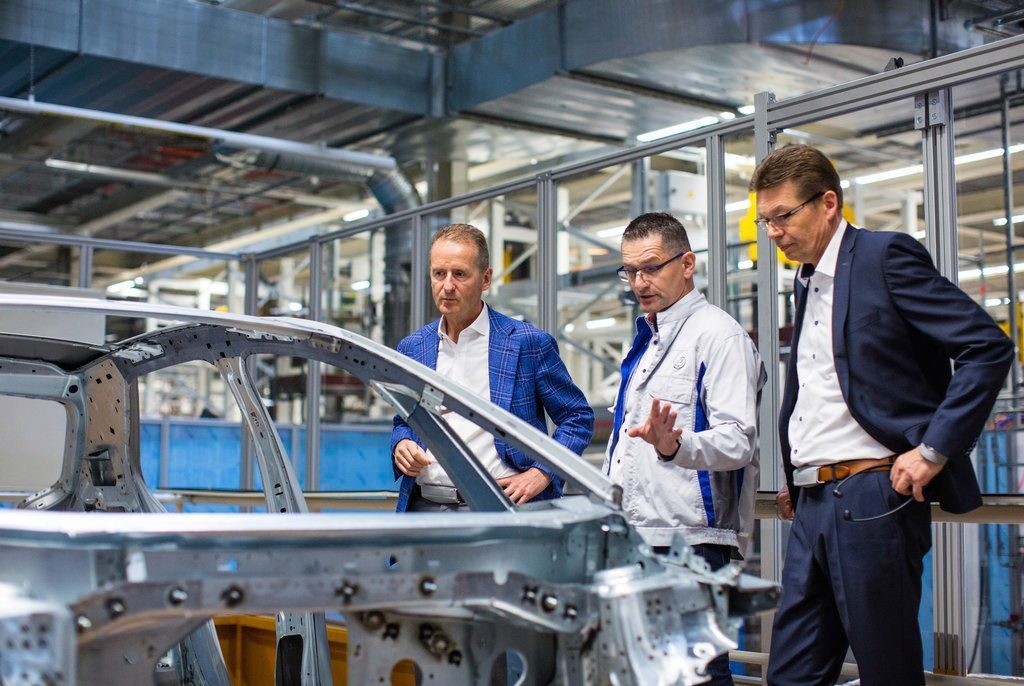Volkswagen has already built 200 pre-production vehicles of its new electric car ID.3
Volkswagen has already built 200 pre-production vehicles of the new electric car ID.3, although none are for sale yet.
The initiative involved the conversion of VW’s vehicle factory in Zwickau, which the company says will eventually be “the largest facility for electric mobility in Europe”.
The members of Volkswagen’s group and brand boards of management, as well as the group works council, were able to see that for themselves at today’s site symposium for all three locations in Saxony held at Zwickau.
The focus was on preparations for start-up of the new ID.3 and building the expertise required for that.
More than 200 pre-production vehicles of the ID.3 have already been manufactured successfully.

The first ID production vehicles are to roll off the assembly line at the end of 2019. Only e-cars will be built at Zwickau by the end of 2020 – up to 1,500 a day for Volkswagen and other Group brands.
Dr Herbert Diess, CEO of the Volkswagen Group, says: “It’s my firm conviction that Germany as an automotive location must also lead the way when it comes to electric mobility.
“That’s why we’re deliberately converting the Zwickau plant into the largest and most efficient e-car site in Europe.
“It’s impressive to see what efforts the team is making to help achieve that transformation. Zwickau can become a model for transformation in our industry.”
The largest and most efficient e-car plant in Europe is currently being established in Zwickau. It is the world’s first complete transformation of a large car factory.
In the future, the plant will solely make e-vehicles based on the Modular Electric Drive Toolkit (MEB) and have a production capacity of 330,000 vehicles a year.
Thomas Ulbrich, member of the board of management of the Volkswagen brand responsible for e-mobility, says: “The transformation to electric mobility is a huge task for Volkswagen, Volkswagen Sachsen and its workforce. We’ve successfully accomplished the first phase of that.
“Around half of the 1,500 new robots for body construction are already in operation, for example. The paint shop is currently being expanded and we’ll commence conversion of the first line in final assembly as planned in the summer.”
Jens Rothe, chairman of the central works council and deputy chairman of the supervisory board of Volkswagen Sachsen, says: “We’re working intensely to prepare our colleagues for the new topics.
“Around 2,800 of the 8,000 employees have already undergone training. We’re making good progress in that.”
In particular, Rothe urged policymakers and municipalities to take quicker and bolder action in expanding the charging infrastructure.
Rothe adds: “We need a lot more commitment here. My fear is that the right priorities are not always being set in this regard.”
Volkswagen itself will expand the charging infrastructure in Zwickau from the current figure of 36 charging points at and around the plant to some 180 in the coming 18 months.
With regard to the more than 135,000 visitors in 2018 and the numerous technological innovations at the Gläserne Manufaktur Dresden, Ulbrich says: “We’ll further expand its specific role as a showcase for electric mobility and digitalization.
“MEB vehicles will also come off the line there in the future.”
The Chemnitz engine plant is working to full capacity on a permanent basis. Under the Pact for the Future, more than 900,000 engines a year are to be built moving ahead. VW says capacity will be expanded gradually to enable that.
Ulbrich: “The compact TSI engines from Chemnitz will earn us the money we need for our transformation to electric mobility.”

